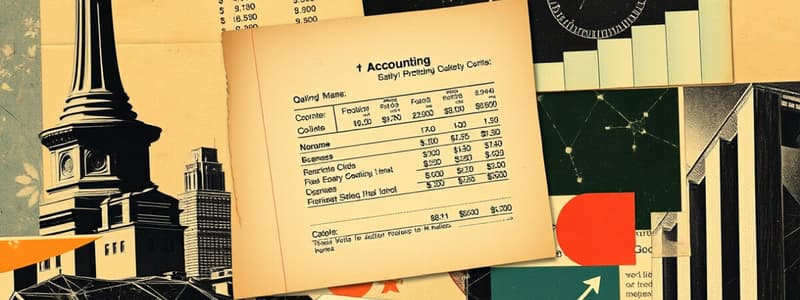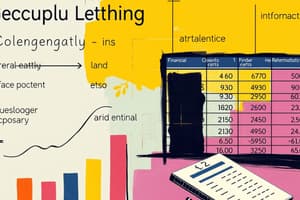Podcast
Questions and Answers
What do current assets refer to?
What do current assets refer to?
- Liabilities of the enterprise
- Assets held for more than one year
- Assets that are not expected to be realized
- Assets expected to be realized within the normal operating cycle (correct)
What is the operating cycle?
What is the operating cycle?
The interval of time from acquisition of merchandise inventory to ultimate collection of cash from sales.
What does cash represent in accounting?
What does cash represent in accounting?
Money, either paper or coins and substitutes like checks and money orders.
What is cash on hand?
What is cash on hand?
What does cash in bank refer to?
What does cash in bank refer to?
What are cash equivalents?
What are cash equivalents?
What is a petty cash fund?
What is a petty cash fund?
What does notes receivable refer to?
What does notes receivable refer to?
What is accounts receivable?
What is accounts receivable?
What is estimated uncollectible accounts?
What is estimated uncollectible accounts?
What does estimated realizable value represent?
What does estimated realizable value represent?
What are advances to employees?
What are advances to employees?
What are inventories?
What are inventories?
What is supplies inventory?
What is supplies inventory?
What are prepaid expenses?
What are prepaid expenses?
What is accrued income?
What is accrued income?
What are property and equipment?
What are property and equipment?
What is land in accounting terms?
What is land in accounting terms?
What is investment property?
What is investment property?
What is a building in financial terms?
What is a building in financial terms?
What is equipment?
What is equipment?
What are furniture and fixtures?
What are furniture and fixtures?
What is accumulated depreciation?
What is accumulated depreciation?
What are depreciable assets?
What are depreciable assets?
What are capital expenditures?
What are capital expenditures?
What is carrying value or net book value?
What is carrying value or net book value?
What are current liabilities?
What are current liabilities?
What is accounts payable?
What is accounts payable?
What is notes payable?
What is notes payable?
What are accrued expenses?
What are accrued expenses?
What is unearned income?
What is unearned income?
What is mortgage payable?
What is mortgage payable?
What is service income?
What is service income?
What is professional income?
What is professional income?
What is rental income?
What is rental income?
What is interest income?
What is interest income?
What is miscellaneous income?
What is miscellaneous income?
What does profit signify in accounting?
What does profit signify in accounting?
What does loss signify in accounting?
What does loss signify in accounting?
What is supplies expense?
What is supplies expense?
What is rent expense?
What is rent expense?
What are repairs and maintenance?
What are repairs and maintenance?
What is salaries expense?
What is salaries expense?
What are uncollectible accounts?
What are uncollectible accounts?
What is depreciation expense?
What is depreciation expense?
What are taxes and licenses?
What are taxes and licenses?
What is insurance expense?
What is insurance expense?
What are utilities expenses?
What are utilities expenses?
What is interest expense?
What is interest expense?
What is miscellaneous expense?
What is miscellaneous expense?
What are gas and oil expenses?
What are gas and oil expenses?
Flashcards are hidden until you start studying
Study Notes
Current Assets and Operating Cycle
- Current Assets consist of resources expected to be sold, consumed, or realized within the operating cycle.
- The Operating Cycle is the time frame from acquiring inventory to collecting cash from the sale of that inventory.
Cash and Cash Equivalents
- Cash encompasses money in various forms: coins, paper currency, checks, and other cash equivalents.
- Cash on Hand refers to physical cash maintained within the business premises.
- Cash in Bank signifies cash that is deposited and held in financial institutions.
- Cash Equivalents are short-term, highly liquid investments easily convertible to cash.
Receivables
- Notes Receivable represent promissory notes received from customers for services rendered or goods sold.
- Accounts Receivable refers to amounts clients owe for services rendered on credit or goods sold on account.
- Estimated Uncollectible Accounts serve as a contra-asset account for expected losses from receivables that may not be collected.
Inventory Types
- Inventories include items held for sale, in production, or materials and supplies for production or service provision.
- Supplies Inventory or Unused Supplies account for stationery or other materials purchased but not yet used.
Prepayments and Accrued Income
- Prepaid Expenses are costs paid in advance for services or goods not yet consumed.
- Accrued Income includes revenue already earned but not yet received in cash.
Property, Equipment, and Depreciation
- Property and Equipment are tangible assets used in operations or for rental and are expected to last beyond one accounting period.
- Land is the physical site of the business building.
- Investment Property refers to land held for future use.
- Buildings account for finished constructions utilized by the business for operations.
- Equipment includes various tools used in operations, while Furniture and Fixtures cover office furnishings.
- Accumulated Depreciation is a contra-asset account that reduces the value of Property and Equipment due to depreciation.
Liabilities
- Current Liabilities are obligations expected to be settled within the operating cycle or one year from the balance sheet date.
- Accounts Payable encompasses financial obligations that involve a promise to pay for goods or services received.
- Notes Payable refers to obligations secured by promissory notes.
- Accrued Expenses are costs incurred but not yet paid.
- Unearned Income involves revenue collected in advance for services not yet provided.
Income Types
- Service Income constitutes all revenue from providing services.
- Professional Income is specifically for earnings derived from a professional practice.
- Rental Income is revenue from leasing out properties managed by the business.
- Interest Income arises from lending money and collecting interest payments.
- Miscellaneous Income covers earnings not tied to the primary business activities.
Profit and Loss
- Profit is defined as the excess of revenues over expenses.
- Loss is the opposite, where expenses exceed revenues.
Operating Expenses
- Supplies Expense is the cost incurred for materials used.
- Rent Expense covers the cost of using property.
- Repairs and Maintenance include expenses for servicing business property and assets.
- Salaries Expense tracks compensation given to employees.
- Uncollectible Accounts reflect anticipated losses on receivables.
Depreciation and Other Expenses
- Depreciation Expense indicates the systematic allocation of an asset's cost over its useful life.
- Taxes and Licenses account for business permit and licensing costs, excluding non-deductible income tax.
- Insurance Expense represents the cost of insurance premiums that have expired.
- Utilities Expense includes expenses for essential services like electricity, water, and telecommunications.
- Interest Expense refers to the cost associated with borrowed funds.
- Miscellaneous Expense captures various minor costs that don’t fit into specific categories.
Gas and Oil
- Gas and Oil account for expenses related to fuel and lubricants used by company vehicles.
Studying That Suits You
Use AI to generate personalized quizzes and flashcards to suit your learning preferences.




